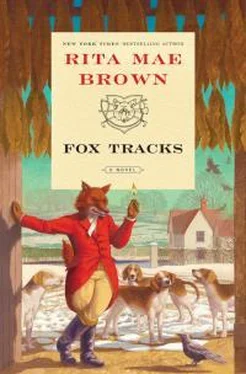“I think I might have a whiskey sour.” Betty stood up, served Ben his drink, then returned for one of her own. For himself, Gray made his usual Blanton’s and bitters.
“Thank you.” Ben gratefully took a sip. “High-test.”
“Hard day.” Gray smiled as he sat down, his own drink in hand.
Betty turned to Ben. “Is the embassy informed?”
“Yes. It is our great good fortune that a former secretary of state lives in Albemarle County. He told me to simply hand them the report of events. Nothing more.”
“Which means they know about the contraband?” asked Sister. She may have ached, but her mind was sharp as ever.
“Sure.” Ben put his glass down. “We’ve been working on this for over a year. This is an annual multi-hundred-million-dollar business. The only monies that come to our citizens are those growers and workers in on the deal, the chain of true tobacco people or as they say: ’bacca. Then there’s the chain of truckers and those who distribute in the big cities. The hubs of distribution collect the cash. In other words, everyone who buys American Smokes in Boston, those store owners pay directly to the distributor and with cash. There are no records that we can find of the transactions. We’ve uncovered only one player in this entire network. And he’s dead.”
“Good Lord,” said Betty. “Tariq never spent much money.” She thought out loud. “Old car. Decent clothing, but nothing to suggest such income.”
“He didn’t have that much. Oh sure, he had more than Custis Hall paid him, but he wasn’t motivated by profit. Tariq was a true idealist. He believed he was protecting, saving even, Coptic Christians.” Ben folded his hands together. “Maybe he did. Who knows.”
“But how? The military will control Egypt one way or another and those men are mostly Muslim. They harass the Christians and the Muslim Brotherhood will go back on every promise they make about protecting all Egyptians. They believe in Sharia, which sure isn’t good for Christians. The Brotherhood and the Army are enemies but both are anti-Christian. The embassy has to be alert to all this.”
“The secretary of state was not exactly forthcoming about why this needs to remain silent, but after working on this case, talking to him, reading everything I can get my hands on, and watching Arab TV, in translation, I have a pretty good idea.” Ben unfolded his hands, placing them on his knees. “We believe dictatorships are bad and that every country should be a democracy, preferably in our image. England has been working on democracy since 1215; little by little, France flip flops since the French Revolution. We believe she’ll remain mostly democratic. Look at the European nations, and the Scandinavian ones; close as they are to us, not all of them are successful at it.”
“Neither are we.” Gray laughed. “But what you’re saying is this is an impossible dream for a Mideast country.”
“He feared the Muslim Brotherhood are elected in force and that they will go back on their word of working with others. It’s a case of the lesser of two evils. The fear of Tariq was that the Muslims will wipe out the Christians or drive them out of Egypt. Religious extremists are rarely motivated by profit. They are much harder criminals to catch.”
“Better the Devil you know than the Devil you don’t,” Sister remarked.
“Yes.” Ben drank his drink down to half. “Graft, payoff, are a way of life in most of the world. You can’t do business in South America without it and not over there either. I didn’t know that the military in Egypt can run businesses, but they can. Anyway, Tariq felt his people would be much safer with a military neutral about Coptic Christians. Maybe he was right. All the money made from contraband is funneled into the pockets of the colonels and generals.”
The four sat there for a time; even the animals were quiet.
“Ideology kills, doesn’t it?” Tootie asked the dagger-to-the-heart question. “Doesn’t matter what it is.”
“It damn near killed Janie,” Gray said in a strong voice. “You could have been killed as well as Sybil and Shaker.”
“I heard you all kept coming for him,” said Sister, “and you Betty, no ratshot even.” She smiled at her best friend.
“I can’t believe I left my gun on the saddle, but I needed to get out of that open field.”
“I was wrong, Ben, I truly was and I apologize,” said Sister. “I expect the sight of that American Smokes pack is what set him off. And I also expect that those men killed with packs placed on their chests were killed because they wouldn’t sell the contraband.”
“That’s what we think. Tariq was in New York when Adolfo was killed. We think other operatives were in Boston and Chicago to kill those noncooperative shop owners. It was a strong warning to others.” Ben enjoyed the crackle and the odor of the fire.
“Carter Weems?” Sister asked.
“I expect he was hauling the stuff out of here and became a liability in some way.”
“And Art?” Sister asked again.
“Art is up to no good, but we can’t catch him at it. But I will give Tariq credit, he held it together, kept the trains running, so to speak, and only lost it at the end.”
“Tell you one thing,” said Betty. “Tariq was smart. He laid a clever drag and waited for the right day. Tracks don’t hold in footing like this. If he’d accomplished his goals, who would have found the drag line?” She raised her eyebrows. “I say the hounds are the real heroes.”
“Always are.” Sister held up Gray’s glass, then took a swig. “How can you drink this stuff?”
Though sore as hell where the cigarette case had pressed against her heart, Sister was returning to true form. “Ben, you’ve been wonderful. I know you live alone. Let me give you a puppy. It’s the purest love in the world.”
CHAPTER 38
Early March came and, cold though it might be, it lifted spirits because spring couldn’t be far. Hunting season for Jefferson ended mid-March.
Despite the bruising, Sister rode, drove her truck, and fell in love with Zoe and her puppies.
Tuesday’s hunt on March 6 was at a new fixture, Close Shave. It couldn’t have been better. They didn’t really know the territory yet, didn’t know their foxes, but as the foxes ran so did they.
After everyone was put up, Zoe given warm food, Sister shepherded Betty and Tootie outside to her truck.
“We’re going to scare people,” she said.
“I do that anyway,” Betty joked. “Especially without my makeup.”
Tootie sat in the rear of the truck. Betty hopped into the front seat, picking up the dryer. “Will you throw this thing away? You are not going to get it fixed.”
“Put it in your lap,” ordered Sister.
Sister drove near Roger’s Corner, where the small crossroads is. She parked where she’d seen the police cruiser weeks before.
“All right. Now I want you, Betty, to sit in the passenger seat and look serious. Tootie, I want you to stand behind me and hold this.” Sister handed Tootie the box used for the Johnson tracking collars. She kept the door of the driver’s side open, opened the window, stepped outside, and rested the black hair dryer on the windowsill.
Crouching behind the door but clearly visible, Sister pointed the hair dryer at the road. “Tootie, lift the tracking aerial over my head.”
“Are we going to get in trouble for this?” Tootie asked.
“I will take full responsibility. Here comes one. Look serious!”
A car heading for them over the speed limit braked dramatically, then glided by.
“Gotcha!” Sister said.
Those three women at their phony speed trap stayed out there in the cold for an hour, scaring the pants off people who thought they’d get a ticket. In a flash, Tootie had an idea of what Sister was like when she was her age.
Читать дальше












